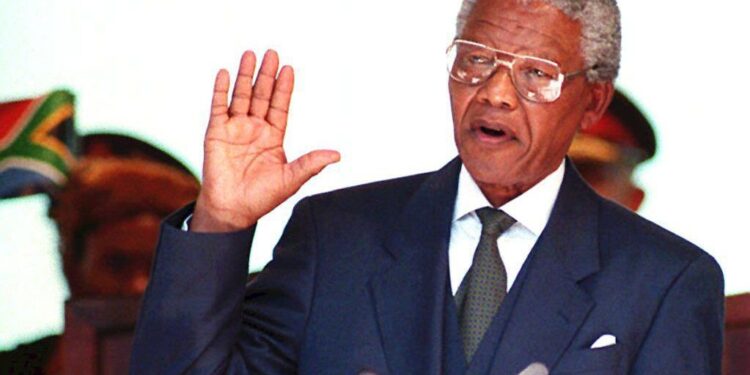Nelson Mandela: From Prison to Presidency – South Africa’s Path to Freedom
Nelson Mandela’s inauguration as the first Black president of South Africa on May 10, 1994, marked one of the most profound political transformations of the 20th century. His journey from political prisoner to president embodied South Africa’s transition from apartheid to democracy and inspired freedom movements worldwide.
Early Life and Activism
Born in 1918 in the rural Transkei region, Nelson Rolihlahla Mandela grew up in a royal Thembu family. After receiving an education rare for Black South Africans at that time, he studied law at the University of Fort Hare and later in Johannesburg.
Mandela joined the African National Congress (ANC) in 1944, helping establish its Youth League. As apartheid laws increasingly institutionalized racial segregation after 1948, Mandela emerged as a leader in the resistance movement, advocating initially for non-violent protest inspired by Mahatma Gandhi.
Imprisonment and Resistance
Following the Sharpeville Massacre in 1960, when police killed 69 peaceful demonstrators, Mandela helped establish Umkhonto we Sizwe (“Spear of the Nation”), the armed wing of the ANC. In 1962, he was arrested and eventually sentenced to life imprisonment during the Rivonia Trial, where he delivered his famous speech declaring he was prepared to die for racial equality.
Mandela spent 27 years in prison, with 18 of those years on the notorious Robben Island. Despite harsh conditions, he maintained his dignity and principles, becoming the world’s most famous political prisoner and a powerful symbol of resistance to apartheid.
Negotiations and Release
By the late 1980s, international pressure through sanctions and boycotts, combined with growing internal unrest, pushed South Africa’s government toward negotiations. President F.W. de Klerk, recognizing the unsustainability of apartheid, released Mandela on February 11, 1990.
Upon his release, Mandela immediately rejoined the struggle, but now focused on peaceful negotiations to dismantle apartheid. His willingness to negotiate with former oppressors rather than seek revenge demonstrated remarkable statesmanship and vision.
Historic Inauguration
After South Africa’s first fully democratic elections in April 1994, Mandela was inaugurated as president on May 10, 1994. The ceremony at the Union Buildings in Pretoria marked a stunning transformation as Mandela took the oath of office before world leaders and a jubilant nation.
In his inaugural address, Mandela proclaimed: “Never, never and never again shall it be that this beautiful land will again experience the oppression of one by another… The sun shall never set on so glorious a human achievement.”
Presidency and Reconciliation
As president, Mandela focused on national reconciliation while addressing the deep inequalities created by apartheid. He established the Truth and Reconciliation Commission, allowing victims to testify about their experiences and perpetrators to confess their crimes in exchange for amnesty.
Perhaps his most symbolic act of reconciliation came during the 1995 Rugby World Cup, when Mandela donned the jersey of the Springboks, long a symbol of white Afrikaner nationalism, uniting South Africans of all races behind the national team.
Legacy
After serving one term as president, Mandela stepped down in 1999, setting a powerful example of democratic transition. He devoted his remaining years to humanitarian causes, particularly the fight against HIV/AIDS and children’s welfare.
When Mandela died on December 5, 2013, at age 95, the world mourned a leader whose moral authority transcended politics. His journey from prisoner to president demonstrated how principled leadership, forgiveness, and vision could transform a deeply divided society.
Today, while South Africa continues to face significant challenges, Mandela’s inauguration remains a watershed moment in world history—a reminder that seemingly insurmountable systems of oppression can be overcome through perseverance, dialogue, and an unwavering commitment to human dignity.
newshub finance



Recent Comments